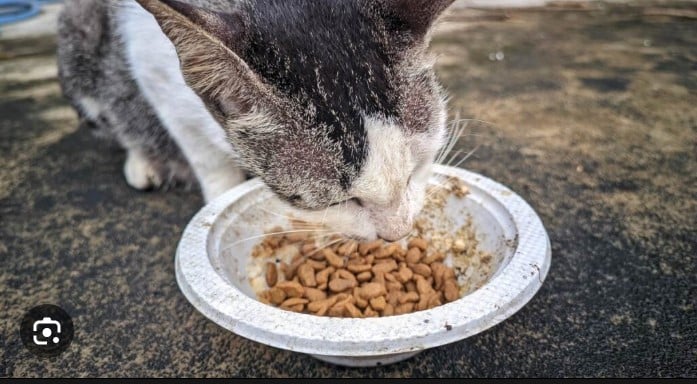Curiosity often sparks questions about what our feline friends can and cannot consume. Many people wonder, “Can Cats Eat Beans?”, as this is a question that comes up often. This article looks closely at how cats eat and what they can safely eat. It talks about whether it’s okay to give cats beans and what problems might happen if they eat them. From the types of beans that are safe for cats to consume to the risks and concerns. We also discussed Common misconception about feeding cats and Potential health benefits of beans for cats. Furthermore, this article provides a comprehensive guide to help you make informed decisions regarding your cat’s diet.
When it comes to feeding our beloved pets, it’s essential to prioritize their health and well-being. While cats are obligate carnivores, meaning their diet primarily consists of meat, they may occasionally show interest in other foods, including beans. However, it’s crucial to understand that not all beans are created equal, and some varieties can pose risks to your cat’s health.
See also: Can Dogs Eat Blueberries?

Nutritional Value of Beans
Beans boast a variety of nutrients that can potentially benefit cats when incorporated into their diet. These legumes are rich in protein, which is essential for supporting muscle growth, repair, and overall health in felines. Furthermore, beans are an excellent dietary fiber source. Fiber helps digestion and prevents constipation in cats. It promotes regular bowel movements. Furthermore, beans contain vitamins and minerals such as folate, potassium, and magnesium, which play important roles in various bodily functions. This includes cell metabolism, nerve function, and bone health. Adding beans to a cat’s diet moderately can give them important nutrients. These nutrients help cats stay healthy. However, it’s important to note that beans should not replace the primary sources of protein in a cat’s diet, such as meat or fish, but rather complement them as an occasional treat.
Beans are common in human diets, full of protein, fiber, and vitamins. But for cat’s consumption, careful consideration is needed. Additionally, while cats might like beans, it’s important to check if they’re good for them. Or if they’re merely a potential source of gastrointestinal upset.
See also: Can Cats Eat Bananas?
Common Misconceptions About Feeding Cats
Common misconceptions about cat feeding habits can confuse pet owners, despite their best intentions to provide proper nutrition. One prevalent myth is that cats can safely consume all human foods without any adverse effects. However, this is far from the truth. Cats are known for their curiosity and may show interest in a variety of foods. However, not all items are suitable for their digestive systems. Feeding cats high-fat, sugary, or salty foods with additives can cause digestive issues and serious health problems. This can lead to digestive upset, nutritional imbalances, and even serious health issues over time.
Additionally, some human foods, such as onions, garlic, grapes, and chocolate, are toxic to cats. They can cause severe reactions or poisoning if ingested. Therefore, it’s essential for pet owners to educate themselves about the dietary needs and restrictions of cats. Additionally, don’t give them food that could make them sick. Consulting a vet for advice on cat food is crucial. Vets help ensure cats stay healthy. They provide personalized diet plans.
See also: Can Cats Eat Coconut?

Types of Beans Safe for Cats
When exploring the question, “Can cats eat beans?”, it’s critical to recognize the differences in bean varieties. While some varieties are moderately safe for feline consumption, others can be harmful or even toxic to cats.
Green Beans
Green beans are often touted as a safe and healthy snack option for cats. These crisp, crunchy vegetables are low in calories and carbohydrates, making them an ideal choice for overweight or diabetic cats. Additionally, green beans are rich in essential nutrients such as vitamins A, C, and K, as well as fiber, which can aid in digestion and promote gastrointestinal health in cats. Whether served steamed, boiled, or raw, green beans can provide a satisfying and nutritious treat for your furry friend.
Black Beans
Black beans are another variety that is generally safe for cats to eat in moderation. These small, shiny legumes are packed with protein, fiber, and essential vitamins and minerals, making them a nutritious addition to your cat’s diet. However, it’s essential to ensure that black beans are thoroughly cooked and free from any seasonings or additives that may be harmful to cats. Serving plain, cooked black beans as an occasional treat can provide your cat with a tasty and satisfying snack without compromising their health.
See also: What does Catnip do to Cats?

Kidney Beans
Kidney beans are yet another bean variety that can be safely enjoyed by cats when prepared properly. These kidney-shaped legumes are rich in protein, fiber, and various vitamins and minerals. Thus, making them a nutritious addition to your cat’s diet. However, it’s crucial to cook kidney beans thoroughly and avoid adding any salt or spices that may be harmful to cats.
It’s crucial to avoid feeding cats raw beans. This is because they contain lectins and phytates, which can be difficult for cats to digest and causes gastrointestinal upset.
Potential Health Benefits of Beans for Cats
While beans may not be a dietary staple for cats, they can offer some potential health benefits when incorporated into their diet in moderation. For example, the fiber content in beans can aid in digestion and promote gastrointestinal health in cats. Additionally, beans are a good source of plant-based protein, which can be beneficial for cats with certain dietary restrictions or allergies.
Furthermore, some pet owners may choose to incorporate beans into their cat’s diet as a means of adding variety and texture to their meals. Mixing cooked beans with your cat’s regular food can provide a change of pace and may encourage picky eaters to consume their meals more eagerly. However, it’s essential to introduce new foods gradually and monitor your cat for any adverse reactions.
See also: Can Cats Eat Popcorn?

Risks and Concerns
While there are potential benefits to feeding beans to cats, it’s essential to consider the associated risks and concerns. Here, we look at the potential risks and health considerations associated with feeding beans to cats.
Digestive Upset
One of the primary concerns regarding feeding beans to cats is the risk of digestive upset. Beans contain compounds such as lectins and phytates, which can be challenging for cats to digest. Consumption of raw or improperly cooked beans can lead to gastrointestinal issues such as vomiting, diarrhea, and abdominal discomfort. Even cooked beans, if not adequately prepared, can pose a risk of digestive upset for cats, making it essential to ensure that beans are thoroughly cooked before offering them to your feline companion.
See also: Are Ferns Toxic to Cats?
Antinutrients
In addition to lectins and phytates, beans may also contain antinutrients that can interfere with nutrient absorption and digestion in cats. For example, soybeans contain phytoestrogens, which can disrupt hormonal balance in cats and may lead to health issues over time. Furthermore, certain varieties of beans may contain substances such as saponins, which can cause gastrointestinal irritation and other adverse effects in cats. Therefore, it’s crucial to exercise caution when feeding beans to cats and to limit their consumption to small amounts occasionally to mitigate the risk of antinutrient exposure.

Potential Allergies
Another concern when feeding beans to cats is the potential for allergic reactions. While beans are not commonly associated with allergies in cats, some felines may have sensitivities or intolerances to certain types of beans or their components. Symptoms of an allergic reaction in cats may include itching, skin inflammation, gastrointestinal upset, and respiratory issues. If you suspect that your cat may be allergic to beans or experiencing an adverse reaction after consuming them, it’s essential to consult with a veterinarian for proper evaluation and guidance.
Moreover, while beans can provide some nutritional benefits, they should not replace the primary components of a cat’s diet, such as high-quality protein from animal sources. Feeding cats a balanced diet that meets their specific nutritional needs is essential for their overall health and well-being. Therefore, beans should only be offered to cats as an occasional treat and should not constitute a significant portion of their diet.
See also: Can Cats Eat Cherries?
Alternative Treat Options
In addition to beans, there are numerous alternative treat options available that can provide cats with variety and nutritional benefits. Cooked meat is a popular choice among pet owners due to its high protein content and palatability for cats. Fish, such as salmon or tuna, is another protein-rich option that many cats enjoy. Although, it’s important to ensure it is fully cooked and free from bones.
Additionally, vegetables such as cooked carrots, peas, or broccoli give cats vitamins. They’re crunchy and satisfy cats’ need to chew. Commercial cat treats formulated specifically for feline dietary needs are also widely available. They come in a variety of flavors and formulations to suit different preferences and dietary requirements. When offering treats to cats, it’s important to do so in moderation to prevent overfeeding and weight gain. Pet owners can offer cats various treats. Different flavors and textures keep cats interested. This ensures they get essential nutrients.
See also: Is Lemongrass Safe for Cats?

Conclusion
In conclusion, cats can eat beans in moderation, but be careful. It is best to introduce beans slowly and watch for any bad reactions. Safe options can provide some nutritional benefits. Options may include cooked green beans, black beans, and kidney beans. These may be enjoyed by cats as an occasional treat. However, it’s crucial to avoid feeding cats raw beans and to monitor them for any adverse reactions.
Furthermore, beans should not replace the primary components of a cat’s diet, such as high-quality protein from animal sources. Feeding cats, a balanced diet that meets their specific nutritional needs is essential for their overall health and well-being. Therefore, beans are okay for cats sometimes. But they shouldn’t be the main food. Cats need meat for most meals. As always, consulting with a veterinarian before making any significant changes to your cat’s diet is recommended. This is to ensure that their health and well-being are prioritized.
See also: https://www.purina.co.uk/articles/cats/feeding/what-cats-eat/human-foods-for-cats

